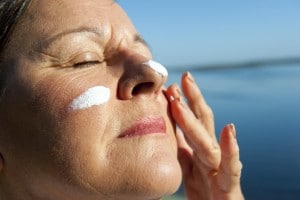We’ve spent time this summer breaking down the marketing of your practice for the summer, patient tips, and more. Now, we will examine a hot issue in summer aesthetics: choosing a sunscreen that will protect your skin in the summer.
When choosing a sunscreen, people often just look at the SPF content to determine if it is a good choice. While SPF is important, a good sunscreen should provide broad-spectrum protection against UVA and UVB rays, must be water-resistant, and have an SPF of at least 30.
Broad Spectrum Protection provides protection against UVA and UVB rays, which is the cause of sunburns and skin cancer. If they only protect against sunburn, then there is no protection against skin cancer or skin aging. That is why it is vital to choose a sunscreen with Broad Spectrum Protection.
SPF does still matter when it comes to picking a sunscreen, but the higher the SPF, the smaller the difference in protection. For example, SPF 50 filters out about 98% of UVB rays and SPF 100 filters out 99% of UVB rays. There is no 100% protection against the sun. Anything under SPF 15 will only protect against sunburn, and not skin cancer or skin aging. Therefore, you should choose a sunscreen with at least SPF 30, but don’t get too worried about having the highest SPF.
Even though a sunscreen says “water-resistant” that does not mean that it is waterproof. In fact, there is no way for a sunscreen to be waterproof or sweat proof. Therefore, you should reapply sunscreen every 2 hours, especially if you are exposed to water or sweat. A majority of sunscreens you see are not water-resistant so be sure to check for this.
A study published in JAMA Dermatology reveals that 75% of consumers have bought beauty products on Amazon, so they took to Amazon to determine the quality of sunscreen that consumers are purchasing. After sorting by the top selling sunscreens, they determined that only 26 of the 65 top-rated sunscreens actually met the standards of the American Academy of Dermatology. Only 62% of the products were advertised as water resistant.
The main point in choosing a sunscreen is to not focus on marketing claims on cosmetic quality and focus on the actual protection of the skin. Choosing the right sunscreen will help protect against not only sunburn but skin aging and skin cancer.

